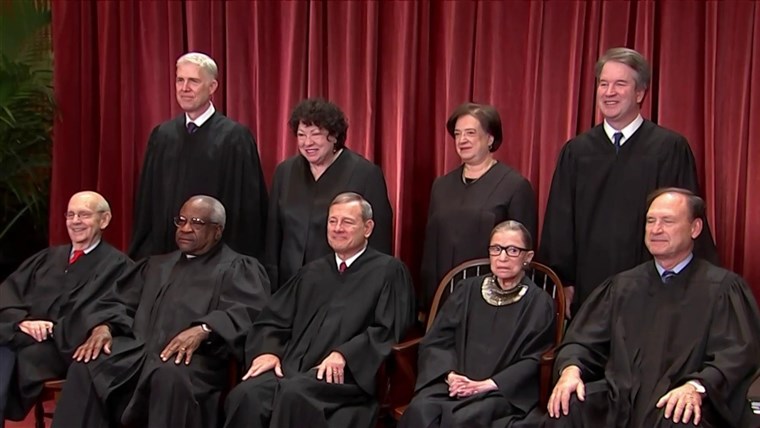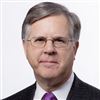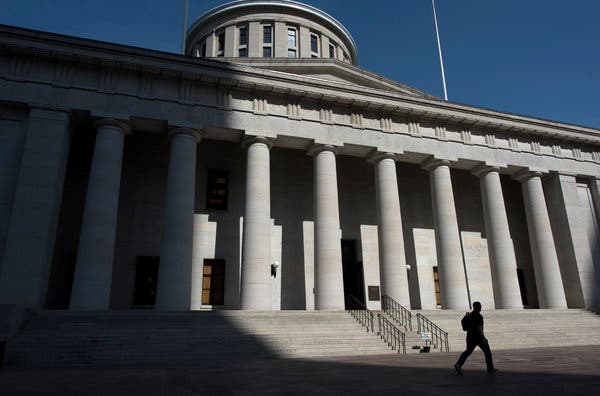WASHINGTON — The justices of the Supreme Court seemed reluctant Wednesday to tamper with the system America uses to choose its president, based on their comments during oral arguments over the workings of the Electoral College.
The issue in the two “faithless elector” cases is a simple one: Are the 538 presidential electors free agents, or must they vote in accordance with the election results in their states? If they are free to vote as they wish, a small group of them, or even a single one in a tight contest, could decide who wins.
When voters go to the polls in November, they do not vote directly for a presidential candidate. Instead, they choose a slate of electors appointed in their states by the political parties of the presidential candidates. Those electors meet in December to cast their ballots, which are counted during a joint session of Congress in January.
Lawyers for four electors from Colorado and Washington state who did not conform to the popular votes in their states urged the court to rule that states can regulate only how electors are chosen, not how they vote in December.
“Once the voting starts, the state disappears,” said Lawrence Lessig, a Harvard law school professor arguing before the court. “States have no power to control how an elector may vote.”
But several members of the court seemed concerned that if electors are free agents, they could end up deciding who wins when the popular vote for president is very close.
“The consequences could be chaotic,” said Justice Samuel Alito. “When there’s an election with a small margin of victory, there would be a concerted campaign to change the vote of a few electors.”
Justice Brett Kavanaugh said judges should avoid creating turmoil when legal issues are close ones.
“We shouldn’t facilitate or create chaos,” he said.
Other members of the court said if the challengers were right, states could do nothing to disqualify electors who took bribes or voted for clearly unqualified candidates.
“If an elector who promised to vote for a state’s winning candidate instead votes for ‘Frodo Baggins,’ the state can do nothing about that?” asked Justice Clarence Thomas, referring to a character in “The Lord of the Rings.”
Download the NBC News app for breaking news and politics
Lessig said nothing in the Constitution gives the states authority to restrict how an elector can vote, but several of the justices said the Constitution doesn’t explicitly block a state from doing so, either.
“If there’s silence, maybe the best thing to do is leave it to the states,” said Justice Elena Kagan.
In more than half the nation, electors are required to obey the results of their state’s popular vote and cast their ballots accordingly. The problem of “faithless electors” who disregard the popular vote outcome has not been much of an issue in American history, because when an elector refuses to follow the results of a state’s popular vote, the states usually simply throw the ballot away.
The cases before the Supreme Court involve faithless electors during the 2016 presidential election. Instead of voting for Hillary Clinton, who won the popular vote in Colorado, faithless elector Micheal Baca cast his vote for John Kasich, the former Republican governor of Ohio. In Washington state, where Clinton also won the popular vote, three of the state’s 12 electors voted for Colin Powell, the former secretary of state.
Baca previously told NBC News that after Donald Trump was the apparent winner in November, “I thought we would need electors who would choose a moderate compromise candidate. We wanted to put our country before party and maybe throw the election (into) the House of Representatives.”
Colorado tossed Baca’s vote out and found another elector who voted for Clinton. So he sued, and the Tenth Circuit Court of Appeals based in Denver ruled that electors can vote for any legitimate candidate.
States are free to choose their electors however they want, the appeals court said, and can even require electors to pledge their loyalty to their political parties. But once the electors are appointed and report in December to cast their votes, they are fulfilling a federal function, and the state’s authority has ended.
In Washington, the state accepted the votes of its rebel electors but fined them for violating state law. They challenged the fines, but the state supreme court upheld the law requiring them to conform to the popular vote.
The Supreme Court took both cases to decide which outcome is the correct one. The court ruled in 1952 that states do not violate the Constitution when they require electors to pledge that they will abide by the popular vote. But the justices have never said whether it is constitutional to enforce those pledges.
Lessig has said he hopes the cases will eventually lead to a change in the Electoral College, either through a constitutional amendment or by encouraging more states to adopt a system in which they would assign all of their electors to whoever wins the nationwide popular vote for president.
Fourteen states have already agreed to do so. An interstate agreement to make the change would take effect once the participating states represent at least 270 votes, the minimum number needed to be elected president.
But after Wednesday’s argument, it seems unlikely these cases will modify the system or spur calls for changing how the Electoral College works.
The court will likely issue its decision by July.

 Pete Williams
Pete Williams
